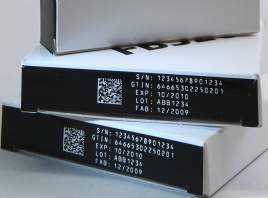EU stakeholders move ahead with drug verification scheme
Phil Taylor, 16-Apr-2013
 The EU drug industry has taken another step forward towards the implementation of a medicines traceability platform after awarding a contract to IT provider Solidsoft.
The EU drug industry has taken another step forward towards the implementation of a medicines traceability platform after awarding a contract to IT provider Solidsoft.
The European Federation of Pharmaceutical Industries and Associations (EFPIA) and other stakeholders announced the five-year contract today after a year-long tender process aimed at finding a supplier for the technology underpinning its European medicines verification system (EMVS).
EFPIA director general Richard Bergström said the move marked the start of the implementation of the EMVS, which is also supported by a broad spectrum of stakeholders in the EU drug sector including parallel import group the EAEPC, wholesaler organisation GIRP and the PGEU pharmacist body.
"Just this past March, Germany experienced one of its most significant counterfeiting scares to date, when it was discovered that a common heartburn counterfeit or substandard medication had made it onto the market," commented Bergström, referring to an incident in which fake product thought to originate in Spain was inadvertently distributed through the supply chain by German wholesalers.
The EMVS is based on the application of unique and random serial numbers on each pack of medicine at the point of manufacture, and the verification of that number in the pharmacy at the point the pack is dispensed to the patient.
The model relies on the use of a European hub - or medicines verification repository - that will handle the transactions between databases operated by stakeholders in the supply chain, and it is this architecture that formed the basis of the tender process.
Solidsoft was among 20 service providers bidding for the tender, which is currently being organised by EFPIA but will eventually be run by the European Medicines Verification Organization (EMVO), a body that should be set up by the various stakeholders in the coming months.
"Solidsoft proposed the most cost-effective solution [and] has received strong support from the technical community which views its technologies at the forefront of what the IT community could provide," said the pharma industry body.
EFPIA completed a successful pilot of the European Stakeholder Model (ESM) in Sweden in 2010 and is trying to position its scheme as a suitable model for a pan-European system, as envisaged by the 2011 Falsified Medicines Directive.
While the FMD introduces a requirement for safety features on medicine packs, the specific details are not due to be finalised until a delegated act is finalised (expected in 2014). It been widely interpreted that the deliberations on safety features are likely to lead to a mandate for serialisation of secondary medicine packaging with machine-readable codes.
Commenting on the announcement, Mark Davison of consultancy firm Blue Sphere Health said: "the saga of serialisation and epedigree is not over, and there is a long way to go before drug traceability is global and routine, but implementation of the ESM represents a big step forward".
Other models vying for attention as European lawmakers deliberate over the detail of the FMD include the eTACT pilot developed by the European Directorate for the Quality of Medicines & Healthcare (EDQM).
Image courtesy of Marchesini

©
SecuringIndustry.com




 The EU drug industry has taken another step forward towards the implementation of a medicines traceability platform after awarding a contract to IT provider Solidsoft.
The EU drug industry has taken another step forward towards the implementation of a medicines traceability platform after awarding a contract to IT provider Solidsoft.